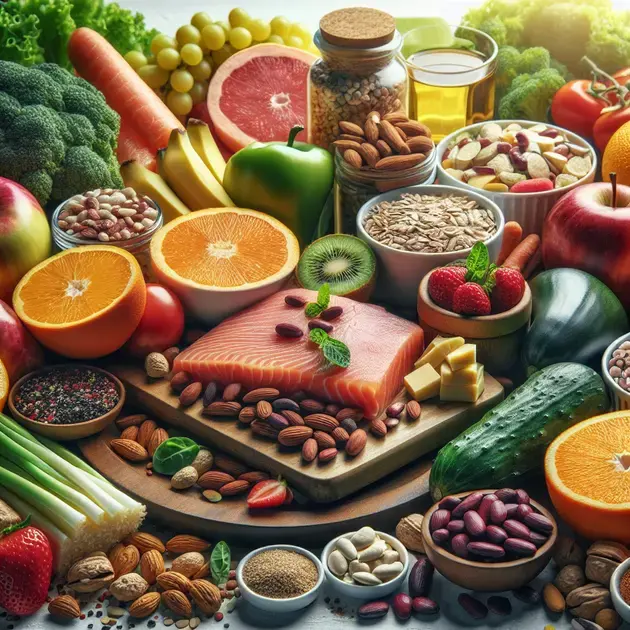Are you looking to shed some extra pounds? Eating these foods can help you lose weight in a healthy and sustainable way. Incorporating certain foods into your diet can make a significant difference in your weight loss journey.
Studies have shown that foods rich in fiber, such as leafy greens, whole grains, and legumes, can help you feel full for longer periods, reducing the chances of overeating. Including protein-rich foods like lean meats, fish, and tofu can also boost your metabolism and aid in weight loss. By making thoughtful choices about what you eat, you can achieve your weight loss goals more effectively.

Fiber-rich foods to keep you full longer
Eating enough fiber is essential for maintaining a healthy diet and feeling full longer throughout the day. By incorporating fiber-rich foods into your meals, you can help control your appetite and reduce overall calorie intake. Here’s a step-by-step guide to finding and including fiber-rich foods in your diet:
1. Look for Whole Grains:
Choose whole grains such as quinoa, brown rice, and whole wheat bread. These options are high in fiber and can help keep you satisfied for longer periods.
2. Include Legumes:
Beans, lentils, and chickpeas are excellent sources of fiber. Incorporate these legumes into soups, salads, and side dishes to increase your fiber intake.
3. Add Fruits and Vegetables:
Fruits like apples, berries, and bananas, as well as vegetables like broccoli, spinach, and carrots, are rich in fiber. Include a variety of colorful fruits and vegetables in your meals for maximum fiber benefits.
4. Snack on Nuts and Seeds:
Almonds, chia seeds, and flaxseeds are great snacks that provide both fiber and healthy fats. Keep a mix of nuts and seeds on hand for when hunger strikes between meals.
5. Read Food Labels:
Pay attention to food labels when grocery shopping to identify products high in fiber content. Look for items with at least 3 grams of fiber per serving.
Protein-packed options to boost metabolism
Protein is an important nutrient that can help boost metabolism and support weight loss efforts. Including protein-rich foods in your meals can help you feel full and satisfied while also maintaining muscle mass. Here’s a guide on how to incorporate protein-packed options into your diet:
1. Choose Lean Protein Sources:
Opt for lean protein sources such as chicken breast, turkey, fish, and tofu. These options are low in fat and high in protein, making them ideal for boosting metabolism.
2. Include Dairy Products:
Greek yogurt, cottage cheese, and low-fat milk are excellent sources of protein. Enjoy these dairy products as snacks or include them in smoothies for a protein boost.
3. Snack on Protein Bars:
Protein bars are convenient options for a quick protein fix on the go. Look for bars with at least 10 grams of protein and minimal added sugars.
4. Add Eggs to Your Diet:
Eggs are a versatile and nutrient-dense protein source. Include eggs in your breakfast or as part of a salad for a protein-packed meal.
5. Incorporate Plant-based Proteins:
Beans, lentils, quinoa, and edamame are plant-based sources of protein that can enhance metabolism. Include these options in stir-fries, salads, and bowls for a protein-rich meal.
Make smart food choices for successful weight loss
When aiming for successful weight loss, making smart food choices is key to achieving your goals. By selecting nutrient-dense and balanced meals, you can support your weight loss journey while nourishing your body. Here are steps to help you make smart food choices:
1. Focus on Whole Foods:
Prioritize whole foods such as fruits, vegetables, whole grains, lean proteins, and healthy fats. These options provide essential nutrients and support overall health.
2. Watch Portion Sizes:
Be mindful of portion sizes to avoid overeating. Use measuring cups, scales, or visual cues to control serving sizes and prevent consuming excess calories.
3. Limit Processed Foods:
Avoid or minimize processed foods high in added sugars, unhealthy fats, and refined grains. Opt for whole, unprocessed foods to fuel your body effectively.
4. Stay Hydrated:
Drink an adequate amount of water throughout the day to stay hydrated and support optimal metabolism. Water can also help control hunger and prevent overeating.
5. Plan Ahead:
Prepare meals and snacks in advance to avoid impulsive food choices. Planning ahead can help you make informed decisions and stick to your weight loss goals.

Foods that can help regulate blood sugar levels
Regulating blood sugar levels is crucial for overall health, particularly for individuals with diabetes or those looking to maintain stable energy levels throughout the day. Incorporating the right foods into your diet can make a significant difference in managing blood sugar levels effectively.
One of the key foods that can help regulate blood sugar levels is leafy green vegetables such as spinach, kale, and collard greens. These vegetables are rich in fiber, which slows down the absorption of sugar in the bloodstream and helps prevent spikes in blood glucose levels.
In addition to leafy greens, incorporating fatty fish like salmon and mackerel into your diet can also be beneficial. These fish are high in omega-3 fatty acids, which have been shown to improve insulin sensitivity and reduce inflammation in the body, helping to regulate blood sugar levels.
Furthermore, adding nuts and seeds to your meals and snacks can provide a healthy dose of protein, fiber, and good fats that help keep blood sugar levels steady. Almonds, chia seeds, and flaxseeds are particularly beneficial for blood sugar control.
Lastly, choosing whole grains over refined carbohydrates can also contribute to better blood sugar regulation. Whole grains like quinoa, brown rice, and oats contain more nutrients and fiber, which slow down the digestion process and prevent rapid spikes in blood glucose.
Incorporating healthy fats for optimal weight loss
When it comes to weight loss, many people mistakenly believe that all fats are unhealthy and should be avoided. However, incorporating healthy fats into your diet is essential for optimal weight loss and overall well-being.
One of the best sources of healthy fats is avocados. Avocados are rich in monounsaturated fats, which have been shown to help reduce belly fat and promote feelings of fullness, ultimately aiding in weight loss.
Another excellent source of healthy fats is olive oil. Using olive oil as your primary cooking oil can provide beneficial antioxidants and monounsaturated fats that support weight loss and improve heart health.
Fatty fish like salmon and sardines are also great options for incorporating healthy fats into your diet. These fish are high in omega-3 fatty acids, which not only support weight loss but also reduce inflammation and boost brain health.
Additionally, nuts and seeds such as walnuts, almonds, and flaxseeds are nutrient-dense foods that offer a good balance of healthy fats, protein, and fiber. Including these in your meals can help you feel satisfied and maintain a healthy weight.
The importance of hydration in a weight loss journey
Staying properly hydrated is a key aspect of any weight loss journey. Water plays a vital role in various bodily functions, including metabolism, digestion, and the elimination of waste products. Ensuring adequate hydration can support weight loss efforts and overall health.
Drinking water before meals can help control appetite and prevent overeating, as thirst is sometimes mistaken for hunger. By staying hydrated, you can support portion control and make healthier food choices throughout the day.
Furthermore, staying hydrated can boost metabolism and aid in the breakdown of fats in the body. Proper hydration ensures that your body can efficiently convert food into energy, making it easier to reach your weight loss goals.
Replacing sugary beverages with water can also significantly impact weight loss efforts. Beverages high in sugar provide empty calories and can sabotage your progress, whereas water is calorie-free and essential for optimal body function.
In conclusion, making a conscious effort to stay hydrated throughout the day can have a profound impact on your weight loss journey. Aim to drink at least 8-10 glasses of water daily and consider incorporating hydrating foods like fruits and vegetables to support your overall health and wellness.
Conclusion
Regulating blood sugar levels is essential for overall health, especially for individuals managing diabetes or seeking to maintain stable energy levels. Incorporating foods like leafy green vegetables, fatty fish, nuts, seeds, and whole grains into your diet can significantly help in managing blood glucose levels effectively.
Incorporating healthy fats, such as avocados, olive oil, fatty fish, nuts, and seeds, is crucial for optimal weight loss and overall well-being. These sources of healthy fats not only aid in weight loss but also promote heart health, reduce inflammation, and support brain function.
Proper hydration is a key aspect of any weight loss journey. Water plays a vital role in metabolism, digestion, and the elimination of waste products. Ensuring adequate hydration can support weight loss efforts by controlling appetite, boosting metabolism, and aiding in the breakdown of fats in the body, ultimately helping you reach your weight loss goals.
